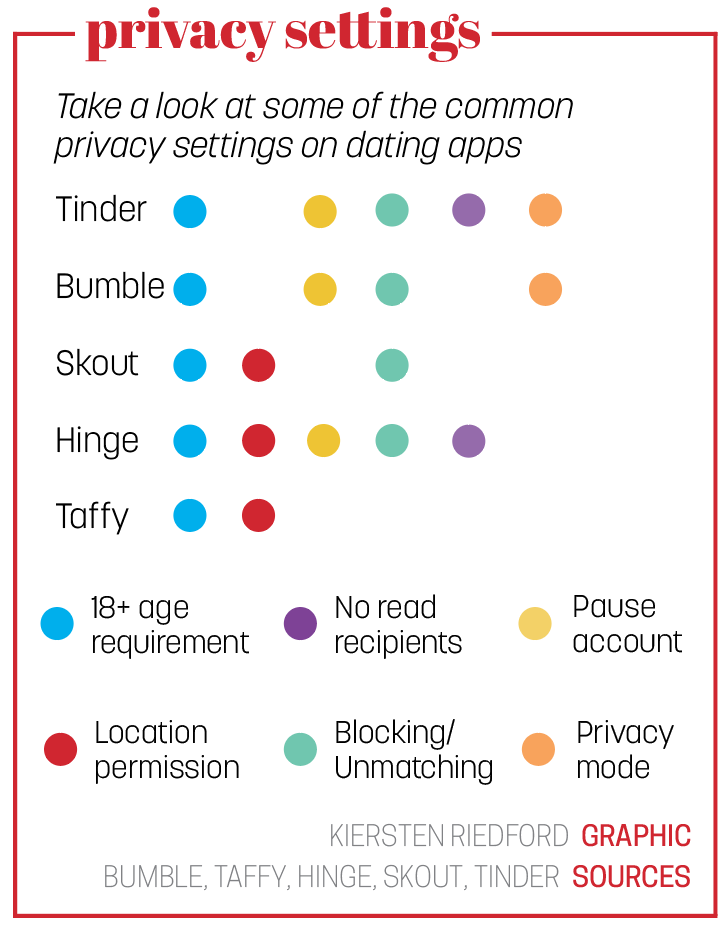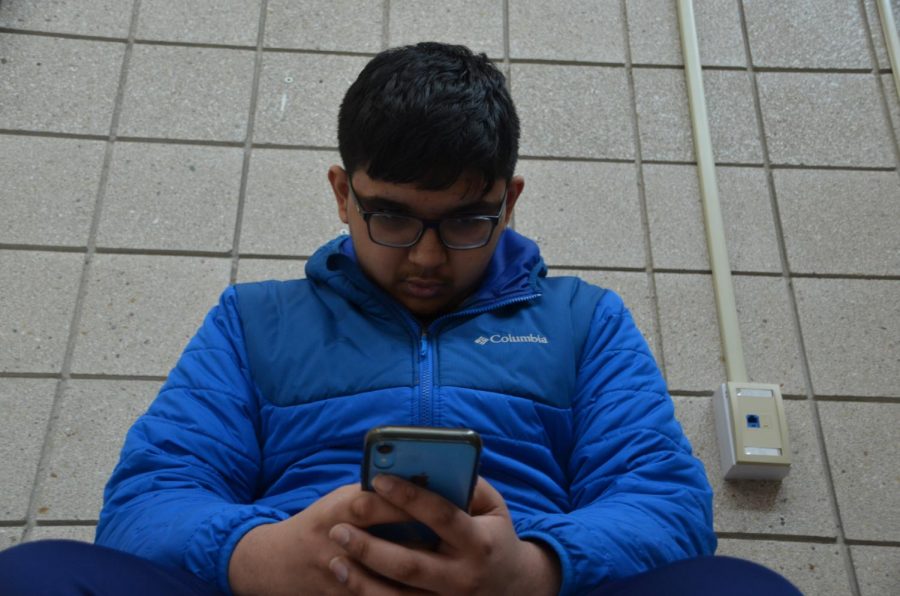Senior Adam Hineiyi is an active user of social media. Normally, he’s surfing the web looking at funny pictures and videos to show to his friends, yet recently he’s delved into online dating. He said he currently uses apps like Tinder and Bumble to try to attract dates—people he’s never met or heard of before. Hineiyi said the reason he dates online is that it provides an easy option.
“The benefit is that it is really easy to use,” Hineiyi said. “The apps pair me with other dating app users nearby, and it’s simpler and faster than the normal way people date and form relationships.”
According to a study conducted by Stanford’s School of Humanities and Sciences, online dating is a popular way couples meet online. In 2009, approximately 22% of couples surveyed reported meeting online, but in 2019, more than 39% said they met online, a 77% increase from the past decade. One reason for this dramatic increase is a change in the way that people trust the internet as it is becoming a staple of common culture.
According to AP Psychology teacher Robin Pletcher, real-world dating is beneficial. It creates an environment where connectedness and feelings are real. It allows people to strengthen themselves. Online dating does not provide these opportunities she said. It does not give rewards or punishments to sustain commitment, and it leaves you with a feeling that there is something better: In the end, there is no investment when you date online.
Pletcher said that online dating, contrary to regular dating, misses all the psychological aspects that normal dating has because of the lack of uniqueness.
“You can hide so much of who you are behind a screen,” Pletcher said. “When you meet someone face to face, you can see mannerisms, you can see those little nuances that make you special and unique. You can put thought behind words, and plan things out in a message, but when you’re actually having dialogue with someone, how do you respond? In general, it is about those unplanned things, which perhaps is why online dating could be worse than conventional dating.“
There are many reasons to not trust people one meets online. According to the Quartz publication, an international news organization, in the last couple of years, sightings of teenagers doing potentially illegal activities for someone they meet online have occurred more often. 72% of these incidents took place at either the home of the victim or the perpetrator. In the United States, the total number of assaults is decreasing, yet online assaults are increasing.

What’s worse is that the negative experiences of online dating create permanent markings in the psychological mindset. According to Pletcher, the opportunity of rejection is so much greater. Because every swipe is a choice, there exist more rejections because of sheer numbers and statistics. Overall, countless rejection can tear down your mindset, lowering your self-esteem and confidence.
“When you hang out with a group of friends, you are looking at meeting ten people when you go out for an event. You may meet one person out of that ten that you strike up conversation with and have an interest in,” Pletcher said. “When you’re swiping people in an app, you could have hundreds. The chance of rejection is so much greater, so for a person who doesn’t have success, they are just going to have rejection after rejection, which can destroy them.”
A poll conducted by CNN in 2017 shows that online dating lowers self-esteem and increases the likelihood of depression. Because of the massive national surges of these dating apps, approximately 1.5 million dates happen every day. When asked, 1,300 of the users of these apps about their confidence, almost 70% said they felt as if they had less self-worth than when they started dating. This is because of the lack of face-to-face authenticities that dating online doesn’t provide. Because discomfort does not exist in these dating apps, there also presents a feeling of loss. In normal relationships, argument and complications overshadowed this feeling of loss. Users of these dating apps said they are seeking dates, not a partner, so anxiety and stress commonly rise, creating negative experiences.
Carey Anderson, Digital Applications and Responsibilities teacher, said she agrees with CNN’s findings. She said talking online and in-person are two very separate actions. In talking online, students should think before they act or post. But in online dating apps, this rule is completely ignored, and in a harmful environment, the risk of depression and stress is more likely. This may lead to poor demeanor in the future.
Anderson said in recent years, the rise of dating apps is helping lead students and adults to worsened digital footprints online.
“I educate students on the pros and cons of their digital footprint. A digital footprint is anything that someone puts online when they log into a computer. Because technology is so advanced today, students need to be aware of what they are putting online because it may have a large impact on their careers and anything in their future,” Anderson said.
Sophomore Tanuj Mangalam has strong opinions against the use of online dating apps.
He said he thinks there is no merit in the apps, and they serve for desperation. Mangalam said he’s seen high schoolers dating online, and it never works in the end.
“Online dating is just really bad for you,” Mangalam said. “You think you can get anyone you want because there are so many other people that date online, but in the real world you can’t. It doesn’t work that way.”
Many other problems are rising from online dating. According to a study by Kaspersky Daily, a daily blog that conducts surveys, 57% of online dating app users are prone to lie to each other. Gender, location, attributes and appearance are a couple of these fallacies. Furthermore, about 61% of users are afraid to have their personal information violated, and about 55% of these users did. Online dating may serve as an outlet for malicious online behavior.
Despite the controversy, Hineiyi said he still views online dating as an opportunity to meet new people and grow new relationships. He said he understands that online dating may present strange scenarios and decisions, but he is ready to make those choices.
“I understand how bad it gets, with all those risks, but I haven’t gone through anything terrible through online dating,” Hineiyi said. ¨I am able to choose people who I prefer, and they could maybe like me back. It’s a win in both situations.”

































![AI in films like "The Brutalist" is convenient, but shouldn’t take priority [opinion]](https://hilite.org/wp-content/uploads/2025/02/catherine-cover-1200x471.jpg)










































![Review: “The Immortal Soul Salvage Yard:” A criminally underrated poetry collection [MUSE]](https://hilite.org/wp-content/uploads/2025/03/71cju6TvqmL._AC_UF10001000_QL80_.jpg)
![Review: "Dog Man" is Unapologetically Chaotic [MUSE]](https://hilite.org/wp-content/uploads/2025/03/dogman-1200x700.jpg)
![Review: "Ne Zha 2": The WeChat family reunion I didn’t know I needed [MUSE]](https://hilite.org/wp-content/uploads/2025/03/unnamed-4.png)
![Review in Print: Maripaz Villar brings a delightfully unique style to the world of WEBTOON [MUSE]](https://hilite.org/wp-content/uploads/2023/12/maripazcover-1200x960.jpg)
![Review: “The Sword of Kaigen” is a masterpiece [MUSE]](https://hilite.org/wp-content/uploads/2023/11/Screenshot-2023-11-26-201051.png)
![Review: Gateron Oil Kings, great linear switches, okay price [MUSE]](https://hilite.org/wp-content/uploads/2023/11/Screenshot-2023-11-26-200553.png)
![Review: “A Haunting in Venice” is a significant improvement from other Agatha Christie adaptations [MUSE]](https://hilite.org/wp-content/uploads/2023/11/e7ee2938a6d422669771bce6d8088521.jpg)
![Review: A Thanksgiving story from elementary school, still just as interesting [MUSE]](https://hilite.org/wp-content/uploads/2023/11/Screenshot-2023-11-26-195514-987x1200.png)
![Review: "When I Fly Towards You", cute, uplifting youth drama [MUSE]](https://hilite.org/wp-content/uploads/2023/09/When-I-Fly-Towards-You-Chinese-drama.png)
![Postcards from Muse: Hawaii Travel Diary [MUSE]](https://hilite.org/wp-content/uploads/2023/09/My-project-1-1200x1200.jpg)
![Review: "Ladybug & Cat Noir: The Movie," departure from original show [MUSE]](https://hilite.org/wp-content/uploads/2023/09/Ladybug__Cat_Noir_-_The_Movie_poster.jpg)
![Review in Print: "Hidden Love" is the cute, uplifting drama everyone needs [MUSE]](https://hilite.org/wp-content/uploads/2023/09/hiddenlovecover-e1693597208225-1030x1200.png)
![Review in Print: "Heartstopper" is the heartwarming queer romance we all need [MUSE]](https://hilite.org/wp-content/uploads/2023/08/museheartstoppercover-1200x654.png)




